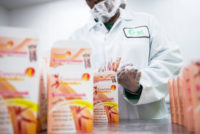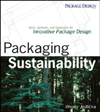Millennials’ frugal and green lifestyles are raising the bar for brands
Packaging plays a role in purchasing considerations.

Appearances can be deceiving. Millennials represent the fastest-growing segment of luxury goods-and-services purchasers, according to a recent study by American Express. Yet they are also giving rise to a new lifestyle that can be characterized in two words: frugal and green.
How to explain such a contradiction? It’s actually two sides of the same coin. To splurge on the high-quality items they covet, especially just-off-the-line electronics, Millennials scrimp in other areas. But even as they look for coupons, sales and promotions and stray from well-known brands to keep their cash-strapped budgets in check, they choose “makers and products that are socially responsible…. fair-trade and offer lower carbon footprints,” notes Ana Nennig, EVP of global consulting firm Havas PR.
What’s more, packaging, which has long been part of the green discussion due to concerns about food waste, sustainability and recyclability, is center stage again. But this time consumers are considering it in a more holistic way to embrace and fulfill this young cohort’s unique views on frugality and social responsibility.
For instance, today’s sophisticated environmentally conscious shoppers are now paying attention to how much energy, water and effort it takes to grow, manufacture and transport food, and finally understand that packaging plays a key role in protecting it. And as a generation raised on a new age version of the three R’s—reduce, reuse and recycle—they know that whether a package is made of renewable materials is just as important as whether it can be recycled, how it is produced and how it fits into their carts, pantries, and cooking and eating habits.
All this makes them more and more attracted to products that they can quickly assess as being healthy, eco-friendly, and easy to grab, carry, store and reuse or recycle – all in one obviously sustainable package. Notably, one-third of U.S. consumers buy broth and soup in carton packages, says SymphonyIRI, because they perceive products in cartons to be fresher, more natural, and better tasting, as well as easier to open, pour and store.
For these reasons, innovative grocery chains where this generation shops, such as Whole Foods and Trader Joe’s, are choosing cartons to package their house brand broths, soups, and beans—a recyclable carton made mainly from paper, a renewable resource, that fulfills many of the criteria that are important to Millennials.
Which begs the obvious question: what is important to Millennial shoppers and how does it impact packaging?
First, it helps to understand their frugal and green lifestyle, driven in part by the fact that many Millennials entered their adult lives during a dire economy. They watched abundance turn to recession, oil and energy prices rise from affordable to sky-high and the availability of the earth’s natural resources go from seemingly unlimited to clearly and rapidly depleting.
Yet their drive to be frugal and green is also driven by their unique place in history as the most multi-cultural and tolerant generation ever, with a strong sense of responsibility to the planet and the human race. Coupled with harsh economic forces they experienced growing up, they have emerged with the new holistic approach to living.
They have also moved well beyond the ethos of the 1970s, when being frugal meant sacrificing quality and being ‘green’ meant buying ultra-expensive, inadequately designed or offbeat products. This frugal and green generation wants it all: quality, smart design, affordable prices and social and environmental responsibility.
Millennials also view the frugal and green lifestyle as integral to their overall sense of well-being and fulfillment. They are more conscientious about their spending habits and less “brand loyal” than their predecessor parent generation, the Baby Boomers, according to Brand Amplitude. But this does not mean that they have forfeited living well or buying green, or that they are completely brand agnostic, notes Nennig, of Havas PR.
In fact, Millennials view taking care of themselves and the environment as one in the same, and they are doing it by living smaller and buying smarter. They have adopted a more simple way of life that prioritizes making selective choices, economizing and reducing waste. And they consistently vote with their dollars for products that share their values. They want to support brands that they can easily see share in their holistic frugal and green philosophy. This is why they will pay more for qualities such as taste and performance, notes Grocery Headquarters.
All this contributes to their notion of ‘value.’ It is not as much about lower prices as it is about the quality consumers expect to receive for their money, says Charles Vila, vice president of consumer and customer insights for Campbell Soup Company. Today’s consumer is looking for a personal return on investment each time they make a purchase, he says, and “it doesn’t matter the size or price of the product; it’s the same for a large-screen TV as it is for a can of soup.” And as the most influential up-and-coming consumer group in existence, throwing their economic weight behind the idea that to have ‘value,’ goods and services must be high quality, eco-friendly and economical is tantamount to expressly requiring manufacturers and retailers to make products that reflect all of these qualities.
So from taking public transportation and living in smaller spaces to cooking and entertaining at home, Millennials favor brands and packaging solutions that reflect their environmentally conscious and minimalist style. And this is particularly true when it comes to the grocery aisle, where they tend to make quick, on-the-spot decisions about what to buy, says the market research consultancy Brand Amplitude. While they buy more for immediate and next-day-or-two needs, move faster through the aisles and spend less time on each purchase decision, they are also technologically savvy and carefully research even small purchases to make sure they get the best product at the best price.
At the same time, they don’t want to have to spend too much of their time trying to decipher which brands are actually doing what they claim to be doing behind the scenes. In effect, they “increasingly judge food by its cover,” and “companies are realizing that time-tested designs like cans, jars and bottles in many ways do not jive with the Millennial lifestyle and this generation’s unique attitude towards food, health and the environment,” notes Brand Amplitude.
So not surprisingly, to capture the new mindset of Millennials, food processors are using shelf-safe cartons like Tetra Recart, which can now accommodate diced fruits and vegetables as well as chunky soups. According to Symphony IRI Group Market Advantage, soups packaged in cartons like Pacific Foods soups are helping to reverse a 10-year decline in soup purchases by consumers 25 and under.
But the Tetra Recart carton package also fulfills a host of other criteria that are important to Millennials, such as protecting its content, preserving its quality; being easier to store thanks to its shape and weight; being made mainly from paper from selectively harvest trees, and producing low carbon emissions thanks to its low weight and efficient shape. For example, one standard truck filled with empty Tetra Recart cartons corresponds to nine standard trucks filled with empty cans.
Clearly, this type of packaging does demonstrates a real commitment to quality and efficiency. From production, transportation and stocking to fitting neatly into a grocery bag, pantry, refrigerator and recycling bin, they honor the frugal and green priorities of today’s consumer while benefiting the retailer in terms of shelf efficiency and operational costs. And it fills a specific need in a new shopping order that is here to stay; research shows that Millennials’ frugal ways are not a fad and will persist long after the recession.
Savvy brands will take their cue and realize that frugal, green and minimalist consumers are in the ascendancy, and the demand for high-value products enclosed in smart, innovative packaging solutions is here to stay.
 Suley Muratoglu, vice president, Marketing & Product Management, Tetra Pak Inc. U.S & Canada, currently runs the company’s presence in core categories, including dairy, beverage and food. Tetra Pak (tetrapakusa.com) is the world's leading food processing and packaging solutions company.
Suley Muratoglu, vice president, Marketing & Product Management, Tetra Pak Inc. U.S & Canada, currently runs the company’s presence in core categories, including dairy, beverage and food. Tetra Pak (tetrapakusa.com) is the world's leading food processing and packaging solutions company.
Looking for a reprint of this article?
From high-res PDFs to custom plaques, order your copy today!









